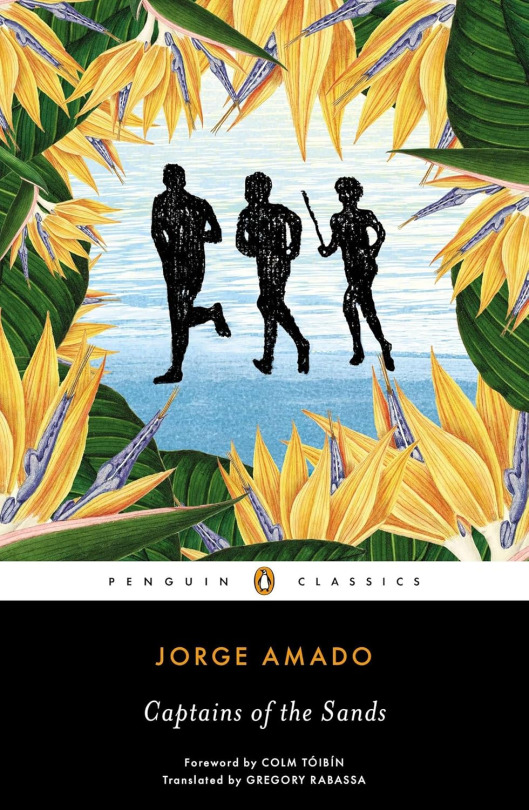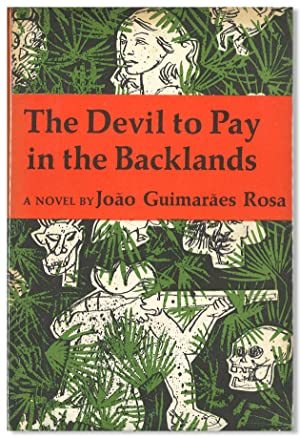The Don Quixote Of Brazilian Nationalism
The Don Quixote of Brazilian Nationalism

"And she thought how diverse and varied life is, how it is richer in sadness than in happiness and how in the variety of life there are more varieties of sadness than there are of happiness and how sadness lies at the core of life."
About the Book
Title: The Sad End of Policarpo Quaresma Author: Lima Barreto Published: 1915 Original Title: Triste Fim de Policarpo Quaresma
Summary
Policarpo Quaresma is a civil servant and a devoted patriot. An extremely idealistic man, he seeks to promote Brazilian culture in every way possible—advocating for Tupi as the national language and even attempting agricultural reforms (you know this is going to go wrong).
Quaresma is almost like Don Quixote—delusional and idealistic. His story is a tragedy, and Lima Barreto masterfully critiques the hypocrisy of Brazilian society, exposing its resistance to change at the beginning of the Republic.
P.S.: This book is frustrating, goddamnit.
Key Themes
Tragedy
Political Criticism
Cultural Identity
Nationalism and Idealism
More Posts from Carnivalofstories and Others
Clove and Cinnamon

“Isn’t that what it is? Love—the most wonderful and most terrible thing in the world.”
About the Book
Title: Gabriela, Clove and Cinnamon Author: Jorge Amado Published: 1958 Original Title: Gabriela, cravo e canela
Summary
The book is set in the 1920s in Ilhéus, a town experiencing a boom in the cacao industry. The novel follows Gabriela, a migrant worker who captivates the bar owner, Nacib, and from this, their love story unfolds. As with most of Jorge Amado's works, it is a highly sensual story.
P.S. There are at least three TV adaptations of this novel in Brazil. It is a very popular story.
Key Themes
Desire
Power dynamics
Gender roles
Social change
Tradition vs. Progress
A true story

"It is truly regrettable that in these times we do not have a Maudsley, who knew the difference between good sense and insanity, to prevent nations from committing acts of madness and crimes against humanity."
About the Book
Title: Backlands: The Canudos Campaign or Rebellion in the Backlands Author: Euclides da Cunha Published: 1902 Original Title: Os Sertões
Summary
This book is a retelling of the War of Canudos (1896–1897), which took place in the state of Bahia. The writer, Euclides da Cunha, was a correspondent for the Brazilian newspaper O Estado de S. Paulo. It is considered the first livro-reportagem (reportage book) in Brazil. Mixing science and literature, the story narrates the war between the republican army and the sertanejos.
Key Themes
True story
Resistence
War
Brazilian backlands
Two Husbands, One Ghost

"BRIEF REPORT (APPARENTLY UNCALLED FOR) OF THE CONTROVERSY THAT SPRANG UP CONCERNING THE AUTHORSHIP OF THE ANONYMOUS POEM THAT CIRCULATED FROM TAVERN TO TAVERN, IN WHICH THE POET LAMENTED THE DEATH OF V ADINHO, WITH THE TRUE IDENTITY OF THE UNKNOWN BARD, FINALLY REVEALED ON THE BASIS OF CONCRETE PROOFS"
About the Book
Title: Dona Flor and Her Two Husbands Author: Jorge Amado Published: 1966 Original Title: Dona Flor e Seus Dois Maridos
Summary
Dona Flor becomes a widow after the death of her reckless and charming husband, Vadinho. Later, she remarries Dr. Teodoro, a respectable and stable man. However, things take an unexpected turn when Vadinho returns as a ghost, forcing her to navigate between her two very different husbands. The novel is a satirical and playful exploration of passion, reason, and desire.
P.S. There’s a famous movie adaptation from 1976, and it was also adapted into a novela!
Key Themes
Desire
Morality vs. Passion
Supernatural elements
Female Independence
This book was burned during the military dictatorship

"In the mysterious night of the macumbas the drums resound like trumpets of war."
About the Book
Title: Captains of the Sand Author: Jorge Amado Published: 1937 Original Title: Capitães da Areia
Summary
Captains of the Sand is set in the city of Salvador and follows the story of a group of orphaned boys living on the streets. They survive through petty theft and share a deep sense of brotherhood. Their leader is Pedro Bala, a boy who is protective of his gang.
The book was banned during the Brazilian military dictatorship for its portrayal of poverty and its perceived communist ideas. It was even burned in a public square in November of 1937, alongside other books (mostly from Jorge Amado).
P.S. There are many things you will not agree with in the book, and it contains an explicit rape scene.
Key Themes
Poverty
Injustice
Social Exclusion
Survival
Love and Revenge

"Convinced that all those who professed love for her, without exception, sought only her wealth, Aurelia reacted to this affront by responding to these individuals in kind."
About the Book
Title: Senhora: Profile of a Woman Author: José de Alencar Published: 1875 Original Title: Senhora
Summary
Senhora follows Aurélia Camargo, a young woman who inherits a fortune and uses it to buy back her former fiancé, Fernando Seixas, who once abandoned her for a wealthier match. As her plan for revenge unfolds, Aurélia finds herself torn between love and pride.
P.S. There is a happy ending.
Key Themes
Love vs. money
Female agency
Honor
Idealist vs. reality
Slum

"And on the muddy ground covered with puddles, in the sultry humidity, a living world, a human community, began to wriggle, to seethe, to grow spontaneously in that quagmire, multiplying like larvae in a dung heap."
About the Book
Title: The Slum Author: Aluísio Azevedo Published: 1890 Original Title: O Cortiço
Summary
The Slum tells the story of a tenement in Rio de Janeiro and the lives of its inhabitants. There are many characters in this story, but the slum itself is considered the main protagonist. Aluísio Azevedo paints a portrait of Brazilian society in the late 19th century.
Key Themes
Social commentary
Urbanization
Prejudice
Class struggle
Environment influence on human behavior
What is sanity?

“Were they all really insane? Did I really cure them? Or is not mental imbalance so natural and inherent that it was bound to assert itself with or without my help?”
About the Book
Title: The Alienist Author: Machado de Assis Published: 1882 Original Title: O Alienista
Summary
Dr. Simão Bacamarte is a brilliant but obsessive physician that made his life mission the study of mental illnesses in the small town of Itaguaí. Convinced he know how to determine who is sane and who is insane, the doctor begins commiting patients based on a rigid and weird criteria. Too emotional? Locked up. Too rational? also locked up.
This book is a mix of satire, irony, and existential dread. Who gets to decide what is insane? What is sanity? Machado de Assis challenges the reader to question everything about reason, while also critiquing the medicalization of traits that, in his time, were considered mental illness (like hysteria).
Key Themes
Science vs Humanity
Satire
Power
Madness vs Reason
The saddest book

"The dog wanted to sleep. She would wake up happy, in a world full of cavies, and would lick the hands of Fabiano—a Fabiano grown to enormous proportions. The boys would roll on the ground with her in an enormous yard, would wallow with her in an enormous goat pen. The world would be full of cavies, fat and huge."
About the Book
Title: Barren Lives Author: Graciliano Ramos Published: 1938 Original Title: Vidas Secas
Summary
Everything about this book is pure sadness. I’ll just tell you now: it doesn’t have a happy ending. The story follows a family living in Brazil’s Northeast, struggling to survive due to the relentless drought. There are many characters (some of whom aren’t even named), but the most iconic is the dog Baleia (Whale in Portuguese), who is nothing but skin and bones.
P.S. The dog chapter is absolutely heartbreaking.
Key Themes
Poverty
Drought
Survival
Northeast Region
Cicle
City of God

"It was kite-flying time in City of God."
About the Book
Title: City of God Author: Paulo Lins Published: 1997 Original Title: Cidade de Deus
Summary
If you’ve ever heard of the Brazilian movie City of God, you already have an idea of how the story unfolds. The novel follows the lives of the residents of Rio de Janeiro’s most notorious favela, offering a glimpse into the harsh reality of poverty.
Key Themes
Crime
Violence
Drug Trafficking
Social Inequality
Journey Through the Backlands

"Did that make sense? But he was neither crazy nor worried, nor ready for hanging. Even when a capybara sits, it does so to think, not to lose heart."
About the Book
Title: The Devil to Pay in the Backlands Author: João Guimarães Rosa Published: 1956 Original Title: Grande Sertão: Veredas
Summary
The Devil to Pay in the Backlands blends mysticism, philosophy, and the reality of Brazilian life in the arid Northeast. The narrator, Riobaldo, is a former jagunço who recounts his journey through the backlands.
Key Themes
Good vs. Evil
Destiny
Violence
Searching for meaning

Celebrating Brazilian stories through book recommendations
22 posts